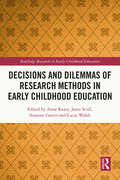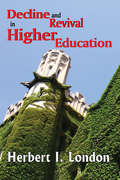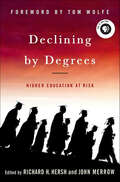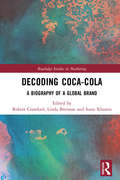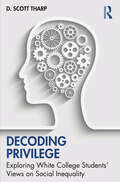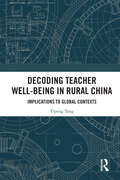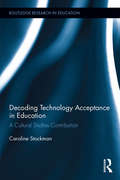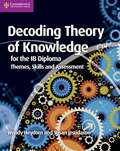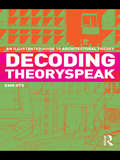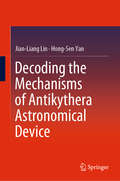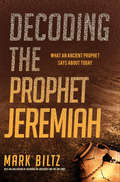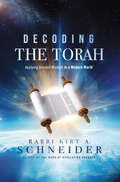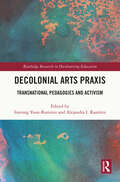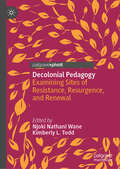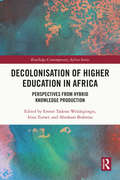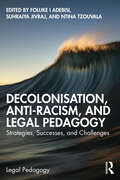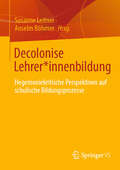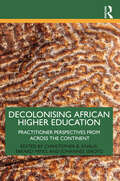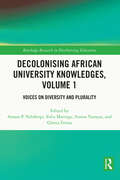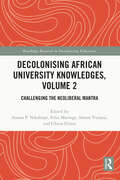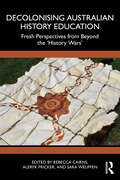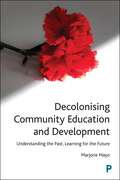- Table View
- List View
Decisions (Sweet Valley High #46)
by Francine Pascal Kate WilliamGeorge's face was grim as he drove along with Robin. "Your aunt has no right to mess up our plans, Robin. You're staying right here. She can't send you three thousand miles away like you're her property." A chill traveled up Robin's spine. George was doing the same thing her aunt was doing-- deciding what was right for her without asking her what she thought!
Decisions and Dilemmas of Research Methods in Early Childhood Education (Routledge Research in Early Childhood Education)
by Anne KearyThis book examines the methodological decisions made by researchers working in early childhood contexts. Viewed from a researcher’s perspective, each chapter explores the journey of the researcher, capturing their decision-making processes in early childhood research. Through themes such as the politics of ethics and how different cultural norms shape research in different localities, Decisions and Dilemmas of Research Methods in Early Childhood Education explores key questions such as: What are the ethical issues arising during early childhood research? Which research traditions and methodologies prevail and why? How are research subjects perceived and positioned within different research contexts? What interdisciplinary tensions or opportunities arise between different ways of working across early childhood research? The book critically unpacks how these decisions are made and by whom during the course of research. Each chapter includes reflections of researchers working across disciplines such as education, health and social work to understand the thinking, forces and actors that shape decisions made during the research process. This is essential reading for researchers working in early childhood contexts in fields such as social work, health, education, criminology, psychology and more.
Decisions: Seeking God's Guidance (LifeGuide Bible Studies)
by Donald BakerDo you sometimes wish that the Bible could make your decisions for you? Donald Baker is familiar with this desire. He writes, "God has given me free will, and while I appreciate his confidence in my ability to choose, there are times when I wish that he would make the decisions for me." The Bible won't give you a direct answer to each choice—or dilemma—you face. But the Bible will teach you how to make decisions wisely, confidently and in harmony with God's will. This nine-session LifeGuide Bible Study will introduce you to the Bible's lessons on decisionmaking—and show you how to apply what you learn to your own decisions, big and small. For over three decades LifeGuide Bible Studies have provided solid biblical content and raised thought-provoking questions—making for a one-of-a-kind Bible study experience for individuals and groups. This series has more than 130 titles on Old and New Testament books, character studies, and topical studies. PDF download with a single-user license; available from InterVarsity Press and other resellers.
Deck the Halls, We're Off the Walls! (My Weird School Special)
by Dan GutmanA. J. and the gang from My Weird School star in this series of after-school, holiday-themed chapter books featuring brand-new hilarious stories and thirty-two pages of games, puzzles, and more. Its Christmas, and you know what that means Santa Claus is coming to town Or at least to the local mall. But what happens when kid rapper Cray-Z gives a Christmas concert at the same mall and all his fans go bananas? One things for sure--if A. J. and his friends from Ella Mentry School want to save the day, they will need a Christmas miracle. Bestselling author Dan Gutman brings his wacky, kid-friendly sense of humor to this all-new series of holiday adventures. With My Weird School trivia and Christmas-themed facts and puzzles, this is one weird Christmas special you dont want to miss
Decline and Revival in Higher Education
by Herbert I. LondonThis is an analysis of higher education in the past half century, a period of dramatic change and democratization. But it is more than that. The author has been a participant in the struggle to stem the decline in higher education, as it moved from an emphasis on classical liberal values toward relativism and ideological extremism. This volume reflects an awareness of what has been lost, but sees hope for a revival of traditional values as technological change and awareness of failure forces institutions to examine their premise. Herbert I. London has provided here fuel for fundamental redirection in American college and university affairs. Decline and Revival in Higher Education is uncompromising in its concerns, but points the way toward a future linked to the best of the past.The work follows the personal evolution of the author, while at the same time, describes the devolution of university standards in such institutions as Columbia, Duke, the University of California at Berkeley, and New York University. While seeing optimistic trends in oases of traditional programming that can serve as a counterweight to campus orthodoxies, London argues that the dramatic transformation of the academy cannot be denied. The social sciences and humanities in particular have become isolated from mainstream requirements in the nation.London deals with concrete concerns, such as the collapse of classic book programs in the contemporary curriculum, the decline and even vigilante raids on opposition in campus publications, the collapse of moral judgment in favor of pure relativism, the transformation of many museums into a storage houses of debris, and the confusion of coarse language with democratization. These developments lead the author to write this book, for if the culture wars are over, the American people may be the losers.
Declining by Degrees: Higher Education at Risk
by Richard H. Hersh and John MerrowWhat is actually happening on college campuses in the years between admission and graduation? Not enough to keep America competitive, and not enough to provide our citizens with fulfilling lives.When A Nation at Risk called attention to the problems of our public schools in 1983, that landmark report provided a convenient "cover" for higher education, inadvertently implying that all was well on America's campuses.Declining by Degrees blows higher education's cover. It asks tough--and long overdue--questions about our colleges and universities. In candid, coherent, and ultimately provocative ways, Declining by Degrees reveals:- how students are being short-changed by lowered academic expectations and standards;-why many universities focus on research instead of teaching and spend more on recruiting and athletics than on salaries for professors;-why students are disillusioned;-how administrations are obsessed with rankings in news magazines rather than the quality of learning;-why the media ignore the often catastrophic results; and-how many professors and students have an unspoken "non-aggression pact" when it comes to academic effort.Declining by Degrees argues persuasively that the multi-billion dollar enterprise of higher education has gone astray. At the same time, these essays offer specific prescriptions for change, warning that our nation is in fact at greater risk if we do nothing.
Decoding Coca-Cola: A Biography of a Global Brand (Routledge Studies in Marketing)
by Robert CrawfordThis collection of essays delves into the Coke brand to identify and decode its DNA. Unlike other accounts, these essays adopt a global approach to understand this global brand. Bringing together an international and interdisciplinary team of scholars, Decoding Coca-Cola critically interrogates the Coke brand as well its constituent parts. By examining those who have been responsible for creating the images of Coke as well as the audiences that have consumed them, these essays offer a unique and revealing insight into the Coke brand and asks whether Coca-Cola is always has the same meaning. Looking into the core meaning, values, and emotions underpinning the Coca-Cola brand, it provides a unique insight into how global brands are created and positioned.This critical examination of one of the world’s most recognisable brands will be an essential resource for scholars researching and teaching in the fields of marketing, advertising, and communication. Its unique interdisciplinary approach also makes it accessible to scholars working in other humanities fields, including history, media studies, communication studies, and cultural studies.
Decoding Privilege: Exploring White College Students' Views on Social Inequality
by D. Scott TharpThis book explores how White students understand the concept of privilege so that educators can more effectively teach students about social power and inequality. Specially, the text examines three elements that influence how White college students understand privilege: Ideas, beliefs, and feelings. As this volume demonstrates, examining all three aspects of students’ understanding is critical for educators who wish to effectively educate White students about the nature of social inequality and specific manifestations of privilege. The book concludes with curricular and pedagogical considerations that educators may incorporate into their teaching practice.
Decoding Teacher Well-being in Rural China: Implications to Global Contexts
by Yipeng TangThis book primarily investigates the factors influencing rural teacher well-being in China.By jointly using international comparable data from Teaching and Learning International Survey (TALIS) as well as China’s survey data from 29 counties of ten provinces in the mainland, this book not only illustrates the current status and influencing factors of rural teacher well-being in 43 education systems from a global perspective but also examines the urban-rural gaps on teacher well-being in China, as well as the explanatory factors in the dimensions of individual, school, and community. Moreover, this book employs the most recent methods developed in well-being literature, such as LASSO, random forests, and SVM, to enhance the data analysis. The book is valuable for international readers concerned about rural education and rural teachers in China. Researchers who focus on the frontier of well-being research will also benefit from the quantitative applications in this book.
Decoding Technology Acceptance in Education: A Cultural Studies Contribution (Routledge Research in Education)
by Caroline StockmanThe process of integrating technology into education often overlooks that technology is a sign; it is not a neutral message conveyor, but rather a material artefact placed into a context inevitably subject to culture. In an original and novel combination, Decoding Technology Acceptance in Education brings together two academic domains not previously pursued together, yet which diverge in many ways: cultural studies and technology acceptance studies. Drawing on empirical data, Stockman demonstrates that teachers activate a meaning-making process through encoding and decoding signs around technology as an artefact of culture, and as a result their acceptance behaviour and decisions rely on the dynamics of the cultural whole to which they belong. In this study, technology acceptance is revisited as an issue of cultural negotiation; the common approach, which provides an instrumental view on technology as a neutral tool, is insufficient for the topic of technology acceptance. Rather than proposing yet another model of technology acceptance, Decoding Technology Acceptance in Education offers a renewed frame of mind and the conclusions it provides are of vital importance to the theoretical and practical advancement of technology acceptance studies, as well as to the practical integration of technology into education. Providing original empirical evidence for the influence of culture on educational decision-making, the book raises awareness for the importance of cultural research in areas where it has been under-considered. This book will be of great interest to researchers, academics and postgraduate students engaged in the study of technology acceptance and technology use in education, as well as those interested in cultural studies.
Decoding Theory of Knowledge for the IB Diploma
by Wendy Heydorn Susan JesudasonWritten by experienced practitioners this resource for Theory of Knowledge for the IB Diploma offers comprehensive coverage of and support for the new subject guide. Decoding Theory of Knowledge (ToK) is an accessible new resource that explores Areas of Knowledge, Ways of Knowing, Personal and Shared Knowledge, the Knowledge Framework and Knowledge Questions. Written in succinct and clear language, this engaging book decodes ToK concepts and helps students develop their critical thinking skills. The book offers extensive support on the new assessment criteria for the essay and presentation. Features include explanation of key concepts to consolidate knowledge and understanding; real-life situations to engage students; practical activities to develop students' thinking, writing and presentation skills; and top tips to provide further guidance and advice.
Decoding Theoryspeak: An Illustrated Guide to Architectural Theory
by Enn OtsExistentialism; Urbanism; Aporia; Deontic; Tabula Rasa; Hyperspace; Heterotopia; Metareality; Structuralism… What does it all mean? The unique language used in architectural theory – both in speech and writing – can appear daunting and confusing, particularly to new architectural students. Decoding Theoryspeak provides an accessible guide to the specialized language of contemporary design for the next generation of thinkers, architects and design leaders. It includes: definitions of over 200 terms clear cross-references illustrations throughout. It is an essential pocket-sized resource for students and practitioners alike.
Decoding the Mechanisms of Antikythera Astronomical Device
by Jian-Liang Lin Hong-Sen YanThis book presents a systematic design methodology for decoding the interior structure of the Antikythera mechanism, an astronomical device from ancient Greece. The historical background, surviving evidence and reconstructions of the mechanism are introduced, and the historical development of astronomical achievements and various astronomical instruments are investigated. Pursuing an approach based on the conceptual design of modern mechanisms and bearing in mind the standards of science and technology at the time, all feasible designs of the six lost/incomplete/unclear subsystems are synthesized as illustrated examples, and 48 feasible designs of the complete interior structure are presented. This approach provides not only a logical tool for applying modern mechanical engineering knowledge to the reconstruction of the Antikythera mechanism, but also an innovative research direction for identifying the original structures of the mechanism in the future. In short, the book offers valuable new insights for all readers who are interested in the Antikythera mechanism.
Decoding the Prophet Jeremiah: What an Ancient Prophet Says About Today
by Mark BiltzCould an ancient prophet hold a present key that will reveal the future?Jeremiah was an Old Testament voice, but he still speaks to our day. Alone and living in a time of chaos, he was a prophet and Levitical priest whose fellow priests and prophets wanted him dead. In fact, everyone wanted him dead—the political leaders, his neighbors, and even his family.At twenty-three years old Jeremiah was told to speak truth to power and not to worry what the consequences may be. God told him that people love to praise the Lord but refuse to do what He says. In spite of the judgments cascading upon the heads of the inhabitants of Jerusalem, the Lord promised a new covenant with Israel and Judah that would revolutionize their walk with Him. In Decoding the Prophet Jeremiah you will discover the following:The warnings from God in Jeremiah&’s day are for our generation as well.Even when you feel betrayed by everyone, there is still hope.God keeps His covenant and will never leave you or forsake you.This book is a clarion call to all believers. We need to see the bigger picture: it is not about us but about God&’s heart and God&’s kingdom. God is looking for warriors who are about advancing His kingdom by storming the gates of hell and setting His sons and daughters free from the clutches of the greatest narcissist of all time.Mark Biltz unpacks two books of the Bible written by the prophet Jeremiah: the Book of Lamentations and the Book of Jeremiah. Biltz has uncovered fascinating Hebraic codes within Lamentations, making this a truly unique message for readers.This book will encourage you to persevere in your faith despite cultural shifts and pressures, much like what the prophet Jeremiah did.
Decoding the Torah: Applying Ancient Wisdom in a Modern World
by Rabbi Kirt SchneiderIn Decoding the Torah: Ancient Wisdom for a Modern World, Rabbi Kirt A. Schneider reveals the timeless relevance of Old Testament laws for today's believers. After reading this groundbreaking book, you will discover how to apply the ancient Laws of the Torah to your modern-day walk with Christ. Unlocking hidden biblical mysteries from Genesis to Deuteronomy, Rabbi Schneider unpacks the historical context of these commandments, showing how they were understood by the ancient Israelites and revealing their spiritual significance for believers today. This book isn't about legalistic observance but about uncovering deeper spiritual truths that transform daily life. Decoding the Torah is the book you never knew you needed - until you read it. There has never been a book quite like this. If you're seeking a practical and insightful guide to understanding the Torah's commandments, this book is for you. It will not only help you walk confidently as a follower of Christ but also deepen your ability to glorify God. In a world filled with mixed messages and half-truths, Decoding the Torah offers the spiritual clarity needed to stay on the narrow path.
Decolonial Arts Praxis: Transnational Pedagogies and Activism (Routledge Research in Decolonizing Education)
by Injeong Yoon-Ramirez Alejandra I. RamírezDecolonial Arts Praxis: Transnational Pedagogies and Activism illustrates the productive potential of critical arts pedagogies in the ongoing work of decolonization by engaging art, activism, and transnational feminisms. Offering contributions from scholars, educators, artists, and activists from varied disciplines, the volume highlights how arts can reveal intersectional forms of oppression, inform critical understandings, and rebuild transnational solidarities across geopolitical borders. The contributors present forms of enquiry, creative writing, art, and reflection which grapple with issues of colonialism, racism, and epistemological violence to illustrate the power of decolonial arts pedagogies in formal and informal education. Using a range of multiple and intersectional critical lenses, through which readers can examine ways in which transnational feminist theorizing and art pedagogy inform, shape, and help strategize activism in various spaces, it will appeal to scholars, postgraduate students, and practitioners with interests in arts education, the sociology of education, postcolonialism, and multicultural education.
Decolonial Pedagogy: Examining Sites of Resistance, Resurgence, and Renewal
by Njoki Nathani Wane Kimberly L. ToddThrough innovative and critical research, this anthology inquires and challenges issues of race and positionality, empirical sciences, colonial education models, and indigenous knowledges. Chapter authors from diverse backgrounds present empirical explorations that examine how decolonial work and Indigenous knowledges disrupt, problematize, challenge, and transform ongoing colonial oppression and colonial paradigm. This book utilizes provocative and critical research that takes up issues of race, the shortfalls of empirical sciences, colonial education models, and the need for a resurgence in Indigenous knowledges to usher in a new public sphere. This book is a testament of hope that places decolonization at the heart of our human community.
Decolonisation of Higher Education in Africa: Perspectives from Hybrid Knowledge Production (Routledge Contemporary Africa)
by Emnet Tadesse Woldegiorgis Irina Turner Abraham BrahimaThis book discusses the status and importance of decolonisation and indigenous knowledge in academic research, teaching, and learning programmes and beyond. Taking practical lessons from a range of institutions in Africa, the book argues that that local and global sciences are culturally equal and capable of synergistic complementarity and then integrates the concept of hybrid science into discourses on decolonisation. The chapters argue for a cross-cultural dialogue between different epistemic traditions and the accommodation 'Indigenous' knowledge systems in higher education. Bringing together critical scholars, teaching and administrating academics from different disciplines, the chapters provide alternative conceptual outlooks and practical case-based perspectives towards decolonised study environments. This book will be of interest to researchers of decolonisation, postcolonial studies, higher education studies, political studies, African studies, and philosophy.
Decolonisation, Anti-Racism, and Legal Pedagogy: Strategies, Successes, and Challenges (Legal Pedagogy)
by Ntina Tzouvala Suhraiya Jivraj Foluke I AdebisiThis book offers an international breadth of historical and theoretical insights into recent efforts to "decolonise" legal education across the world. With a specific focus on post- and decolonial thought and anti-racist methods in pedagogy, this edited collection provides an accessible illustration of pedagogical innovation in teaching and learning law. Chapters cover civil and common law legal systems, incorporate cases from non-state Indigenous legal systems, and critically examine key topics such as decolonisation and anti-racism in criminology, colonialism and the British Empire, and court process and Indigenous justice. The book demonstrates how teaching can be modified and adapted to address long-standing injustice in the curriculum. Offering a systematic collection of theoretical and practical examples of anti-racist and decolonial legal pedagogy, this volume will appeal to curriculum designers and law educators as well as to undergraduate and post-graduate law level teachers and researchers.
Decolonise Lehrer*innenbildung: Hegemoniekritische Perspektiven auf schulische Bildungsprozesse
by Anselm Böhmer Susanne LeitnerDer Band greift Überlegungen auf, die an postcolonial studies im erziehungswissenschaftlichen Kontext anschließen. Schule als Ort der Bildung, aber auch häufig als Ort von Othering und Diskriminierung wird hierbei in den Blick genommen. Die internationale Fachdebatte wird für die deutschsprachige Bildungsforschung erschlossen, gebündelt und in den hiesigen Kontext transferiert. Ziel ist es, den Blick auf Bildung, Schule und die meist verdeckt mitlaufenden Themen zu erweitern, für Diskriminierungswirkungen der Bildungsinstitutionen zu sensibilisieren und der epistemologischen Gewalt eine Dekonstruktion hegemonialen Wissens entgegenzusetzen.
Decolonising African Higher Education: Practitioner Perspectives from Across the Continent
by Christopher B. Knaus Takako Mino Johannes SerotoAcross the African continent, college student activists have long fought to decolonise African institutions. Reflecting ongoing Western colonisation, however, Indigenous African languages, thought, and structures remain excluded from African universities. Such universities remain steeped in Eurocentric modes of knowing, teaching, researching, and communicating. Students are rarely afforded the opportunity to learn about the wealth of knowledge and sustainable wisdom that was and is generated by their own home communities. Such localised Indigenous African perspectives are critical in a world committed to anti-Black racism, capitalist materialism, and global destruction. This book thus clarifies decolonial efforts to transform higher education from its anti-Black foundation, offering hope from universities across the continent. Writers are university administrators and faculty who directly challenge contemporary colonial education, exploring tangible ways to decolonise structures, curricula, pedagogy, research, and community relationships. Ultimately, this book moves beyond structural transformation to call for a global commitment to develop Indigenous African-led systems of higher education that foster multilingual communities, local knowledges, and localised approaches to global problems. In shifting from a Western-centric lens to multifaceted African-centrism, the authors reclaim decoloniality from co-optation, repositioning African intellectualism at the core of global higher education to sustain an Ubuntu-based humanity.
Decolonising African University Knowledges, Volume 1: Voices on Diversity and Plurality (Routledge Research in Decolonizing Education)
by Felix Maringe Amasa P. Ndofirepi Simon Vurayai Gloria ErimaThis timely work investigates the possibility of unyoking and decolonising African university knowledges from colonial relics. It claims that academics from socially, politically, and geographically underprivileged communities in the South need to have their voices heard outside of the global power structure. The book argues that African universities need a relevant curriculum that is related to the cultural and environmental experiences of diverse African learners in order to empower themselves and transform the world. It is written by African scholars and is based on theoretical and practical debates on the epistemological complexities affecting and afflicting diversity in higher education in Africa. It examines who are the primary custodians of African university knowledges, as well as how this relates to forms of exclusion affecting women, the differently abled, the rural poor, and ethnic minorities, as well as the significance of the Fourth Industrial Revolution in the future of African universities. The book takes an epistemological approach to university teaching and learning, addressing issues such as decolonization and identity, social closure and diversity disputes, and the obstacles that come with the neoliberal paradigm. The book will be necessary reading for academics, scholars, and postgraduate students in the fields of Sociology of Education, decolonising education, Inclusive Education, and Philosophy of Education, as it resonates with existing discourses.
Decolonising African University Knowledges, Volume 2: Challenging the Neoliberal Mantra (Routledge Research in Decolonizing Education)
by Felix Maringe Amasa P. Ndofirepi Simon Vurayai Gloria ErimaThis book explores the influence of neoliberal globalisation on African higher education, considering the impact of the politics of neoliberal ideology on the nature and sources of knowledge in African universities. Written by African scholars, the book engages with debates around the commodification of knowledge, socially just knowledge, knowledge transformation, collaboration, and partnerships, and indigenous knowledge systems. It challenges the neoliberal approach to knowledge production and dissemination in African universities and contributes to debates around decolonising knowledge production in Africa. The chapters draw on experiences from universities in different sub-Saharan countries to show how the manifestation of neo-colonialism through the pursuit of the hegemonic neoliberal philosophy is impacting on decolonising university knowledge in Africa. Providing a unique critique of the impact of neoliberal higher education in Africa, the book will be essential reading for researchers, scholars, and postgraduate students in the field of Sociology of Education, decolonising education, Inclusive Education, and Education Policy.
Decolonising Australian History Education: Fresh Perspectives from Beyond the ‘History Wars’
by Rebecca Cairns Sara Weuffen Aleryk FrickerThis book is the first of its kind to showcase a range of fresh and expert perspectives on decolonising history education in Australia. The research-informed chapters by First Nations and non-Indigenous educators and scholars provide guidance on applying practical strategies for decolonising learning and teaching, and moving beyond the ‘history wars’.History has long been the most contentious area of education in Australia. This book tackles the narrow and overtly politicised ‘history wars’ debates and foregrounds the need to re-examine impacts of settler-colonialism on Australia’s history. First-hand knowledge and much-needed teaching practices are presented, demonstrating how decolonisation can be put into action through Australian history education. The chapters present a range of perspectives from the early years right through to higher education settings and argues that there is an increased need for greater awareness, appreciation, and willingness to explore and engage with multiple narratives of truth-telling that are so often contested. Readers are guided to discover how this translates to classroom practice through unique, provocative, and research-informed strategies that foreground applied decolonising approaches.Combining theoretical perspectives and practical ideas, this book is an essential resource to support pre- and in-service teachers, in all education contexts, in navigating the decolonisation of Australian history education. This makes it an important contribution to local, as well as global, decolonising efforts.
Decolonising Community Education and Development: Understanding the Past, Learning for the Future
by Marjorie MayoIt is vital that we decolonise community education and development – learning from the past in order to challenge current discrimination and oppression more effectively. In this book, Marjorie Mayo identifies ways of developing more inclusive policies and practices, working towards social justice for the future. She also tackles the pervasive influence of the ‘culture wars’ undermining work in communities, including the denial of problematic colonial legacies. Inspired by movements such as Black Lives Matter and labour solidarity, the book includes case studies from the US, UK and the Global South, outlining the lessons that can be applied to community education and development training and practice.

